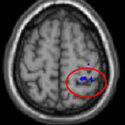Research News
-
Sudden death for young athletes often tied to inherited heart condition
If you or a family member is an athlete, it pays to get your heart checked. Hypertrophic cardiomyopathy can be silent killer for athletes, but if managed well, patients can live active lives.
-
U-M creates the state’s first human embryonic stem cell line
U-M researchers have created the state’s first human embryonic stem cell line, achieving a long-sought goal that provides the foundation for future efforts to develop innovative disease treatments.
-
A black hole slingshot
Hypervelocity stars, discovered about five years ago, are the fastest stars ever observed. They are escaping the galaxy at beyond what was thought to be its stellar speed limit. A U-M study has identified the source of their astounding speed: the black hole at the center of the Milky Way, which acts as a gravitational slingshot, blasting stars right out of the galaxy at 1.8 million miles per hour.
-
Sperm may be harmed by exposure to BPA, study suggests
BPA is a common chemical (more than 6 billion pounds of it are produced annually) that’s stirred controversy in the media over its safety. Now, in one of the first human studies of its kind, researchers have found that urinary concentrations of BPA may be related to decreased sperm quality and sperm concentration. The findings are preliminary but point to the need for more study.
-
A karate belt for wasps
In a remarkable study of animal behavior, U-M researchers have found that a given wasp’s facial markings serve as a sort of karate belt, giving a clue to its fighting ability. Even more interesting, wasps “punish” other wasps that are actually stronger or weaker than their markings suggest. “White belt” wasps who pretend to be black belts are asking to get picked on.
-
Brain connections break down as we age
It’s unavoidable: breakdowns in brain connections slow down our physical response times as we age, a new U-M study suggests.
-
Laser-based missile defense for helicopters being developed
It’s “like throwing sand in the eyes of the missile,” says U-M’s Mohammed Islam. He is developing sturdy and portable lasers that could blind heat-seeking weapons, including shoulder-launched missiles that have proved deadly in Iraq and Afghanistan.
-
Sheri Fink's deep reporting
She won a Pulitzer Prize for uncovering tragic events at a New Orleans hospital following Hurricane Katrina, but that was just one small part of a remarkable career.
-
Are social democracies really better for health than right-wing dictatorships?: U-M study
“These findings raise serious doubts about the belief that the type of political regime and the level of health care spending exert major influences on population health,” says U-M’s Jose A. Tapia Granados.










